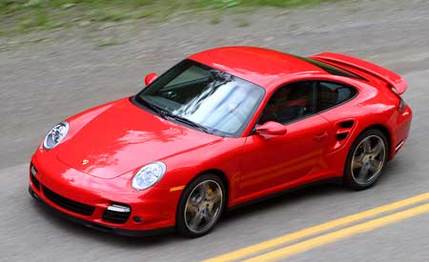 Short Take Road Test
Short Take Road Test
Ever since we dumped the clutch at 4000 rpm in the latest, 997-based, 480-hp 911 Turbo, we've been keeping the Tiptronic (Porsche-speak for automatic) version in the back of our mind. That's because Porsche's claimed acceleration times for the slushbox Turbo are 0.3-second quicker to 60 mph. Based on the manual we tested, the automatic should be capable of hitting 60 mph in a stunning 3.1 seconds and pass the quarter in 11.4. Skeptical that the five-speed automatic version could possibly out-perform the six-speed manual's vicious, four-wheel burnout that results in a flabbergasting 1.1-second catapult to 30 mph and 3.4-second blast to 60 mph, we headed to the track.
Floor it.
Even with a conventional, torque-converter automatic, it's far from straightforward to extract the ridiculous numbers that the Turbo is capable of. First, remember that the latest Turbo has an overboost mode—it ups boost on the 3.6-liter flat-six by 2.9 psi, increasing torque from 460 pound-feet to 505 for 10 seconds when the dash-mounted "Sport" button is ticked and the throttle is pinned—so, to get the best launch, the brake torquing must happen with your right foot all the way to the floor.
With feet firmly planted on both pedals and the car starting to creep forward from the wave of torque, make sure the up-arrow illuminates in the boost-display window-the indication that overboost mode is activated-before releasing the brake. If you've gotten it right, the tricky part is over and all 505 pound-feet of torque are unleashed, giving the driver an impressively harsh shove into the seat. During our testing, however, getting repeatable launches with in overboost mode proved difficult and those extra pounds of boost sat out about half the runs for no apparent reason.
Quicker in some ways, but not all.
Going in, it was an uphill battle for the automatic. Our test car weighed 3584 pounds, a 70-pound penalty compared with the manual. Furthermore, the automatic launches without much wheelspin, unlike the manual, and it therefore doesn't get off the line as swiftly. We hit 30 mph in 1.3 seconds, which is 0.2-second off the manual's pace. But that early deficit is overcome by the Tiptronic's smooth and quick wide-open-throttle upshifts which keep the turbos spooled up, unlike what happens when you lift to shift in the manual. By 60 mph, that lost time is made up and the Tiptronic matches the manual car's 3.4-second blast. From there, it continues to gain ground and edges out the manual in the quarter-mile by a scant 0.1 second—11.6 seconds at 122 mph versus 11.7 at 121—and it stays ahead the rest of the way, hitting 160 mph in 22.1 seconds versus 23.8. In case you're wondering, that quarter-mile time is better than the quickest 505-hp Corvette Z06 we've tested.
Still not the enthusiast's choice.
Does this mean we'd choose an automatic over a manual in the Turbo? Unless you're planning to spend lots of time at a drag strip, where the all-wheel-drive system might not survive frequent four-wheel burnouts, the answer is no. While at the track the five-speed Tiptronic shifts smoothly and quickly, around town it can become bothersome. First off, Porsche automatics prefer to start in second gear, which seems strange coming from such a performance-oriented company. That means if you dig deep enough into the throttle from a standstill, you get a clunky 2-1 downshift. And the upshifts are often less than crisp, more of a slurring between gears. Also, we'd prefer proper shift paddles—left for downshifts, right for upshifts—mounted behind the steering wheel, instead of the Turbo's toggle switches on the front of the wheel that control shifts in both directions. And, not surprisingly, the response time is noticeably slower than automated manuals like Audi's rapid-shifting dual-clutch DSG. Not helping the Tiptronic's case is the $3420 option price, but maybe at the Turbo's starting price of $123,695, a few grand isn't important.
Other than its missile-like acceleration, the 911 Turbo is an extremely attractive and competent sports-car that could comfortably be driven every day of the year. Although the wide, grippy tires that help it to corner neutrally at 0.97 g on the skidpad (same as the manual), and stop repeatedly from 70 mph in less than 150 feet do produce a lot of road noise. And the Turbo's steering isn't as sharp as lighter, rear-drive 911s nor is its exhaust note nearly as exhilarating as the 8400-rpm scream of the wickedest naturally aspirated 911s, the GT3 and GT3 RS. But the debate is over. It's the ultimate for tearing down the straights.